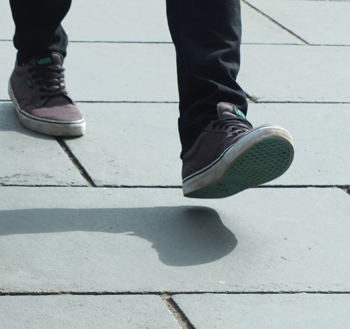The Secret Of Habit Change Is To Step
THE SECRET OF HABIT CHANGE IS TO STEP (ISSUE 157) DECEMBER 9, 2014
By Diane Gold
 The secret of habit change is to step. No one’s saying it’s easy. I am saying it’s not complex. I don’t care how many times we’ve heard the idea that we have to believe in ourselves to motivate or have a positive mental attitude to get it done; it’s just not true. It may be an easier road, but that may not be our reality. And, once we step; we will believe and motivate.
The secret of habit change is to step. No one’s saying it’s easy. I am saying it’s not complex. I don’t care how many times we’ve heard the idea that we have to believe in ourselves to motivate or have a positive mental attitude to get it done; it’s just not true. It may be an easier road, but that may not be our reality. And, once we step; we will believe and motivate.
EASY MOTIVATION
It’s easy to walk through the tunnel when there’s money waiting for us at the other end.
It’s easier to get started when we have a partner with which to work or a coach screaming,
“Let’s go, let’s go,”
in our face.
It’s pretty simple to take a positive step when our world is balanced and clean.
But, these conditions are not necessary.
NOT SO EASY MOTIVATION
On the other hand, It may not be so easy to take a step different from the one we have the habit of doing should this habit be huge and not supportive of what we are doing. Definitely, we automatically think it’s not easy.
It’s not so easy to make a change when we are in pain of any sort is present since pain diminishes power in each of us.
It’s not so easy to walk in a new direction when everyone else is walking the other way.
It’s not easy to step when we are tired. And if we have been working on replacing a habit for a long time, the energy we have consumed in thinking about it and doing things about it can make us very tired.
And, it’s not so easy when most people tell us we have to endure some multi-step process that is more than one step. One step is hard enough.
THE SECRET REALITY
 The secret reality is that we can take a step even when:
The secret reality is that we can take a step even when:
1) we have no motivation to self-change,
2) we don’t believe in ourselves,
3) we have no personal balance,
4) we are in pain,
5) we cannot find joy in our lives.
Look at these examples of how people use other focii to get them to take a step, proving the 5 conditions are not necessary.
1) Military and religious personnel commonly refrain from cigarettes, the object of their addiction, during training runs or services.
2) Many religious practitioners in addictive behaviors refrain from their addiction on their Sabbath day, because they place a higher value on their God belief system than they do on their body’s need for a substance or activity. Many people in addictive behaviors refrain from their addiction for a few hours of church time, valuing the God system over the addictive reward.
(Unfortunately, there are some people in addictive behaviors who do not refrain on the Sabbath day but value a God belief system second. Most God belief systems include guilt for not valuing the belief system more than the object of addiction. Therefore, this scenario means guilt fits into the particular equation.)
 3) Some clinical trials have had participants delay using their object of addiction in trade for a future reward of a possible heightened amount of their substance of choice or getting a small amount of money.
3) Some clinical trials have had participants delay using their object of addiction in trade for a future reward of a possible heightened amount of their substance of choice or getting a small amount of money.
There was one such clinical trial in which trial participants were given a choice: abstaining for a longer period of time than others with the promise of a chance of getting more of their object of addiction at the end of the daily protocol. This meant the participants might not get the enhanced amount of their object. Even so, most chose abstaining longer with the chance of receiving the enhanced amount of stimulation.
CONCLUSION
 Motivation to change, self-belief, balance, pain and joy do not enter into these scenarios. Commitment to military protocol or a belief system has caused people to delay the object of addiction. More comfortable living conditions have caused people to delay getting the object of addiction. And finally, the concept of the thrill of receiving an increased amount of the object of addiction was an excellent motivator.
Motivation to change, self-belief, balance, pain and joy do not enter into these scenarios. Commitment to military protocol or a belief system has caused people to delay the object of addiction. More comfortable living conditions have caused people to delay getting the object of addiction. And finally, the concept of the thrill of receiving an increased amount of the object of addiction was an excellent motivator.
The big picture is that the secret of habit change is to step, make that move, move the foot over the line. That’s what it takes. Only to step! That is the secret.
It must be done with expediency since we only have a short time to step. Otherwise our old behavior will surface, and we will get lost in it. I can hear the quiz show music where the clock is counting down. I couldn’t have pictured that when I was in the middle of struggling to replace a habit, since I would have been busy with my urges. All I could do was step. That’s all anyone has to do.
Let the secret of habit change out in the open. Just step!
ACTION STEP
There is only 1 action to be taken. Within 5 to 15 seconds of receiving the urge to take the action that usually gets you to your object of addiction, step. Even if you take 1 step in the direction away from the door that holds the object of addiction and then run right back to your object of addiction; that can be considered a successful step. Maybe tomorrow you will take one step. And then another, before you run back to your object of addiction. This, too, is a success. There Is Only 1 Action: Step!
Please consider these words. Any 1 step in a new direction is a success. Rome was not built in a day. Your habit was not built in a day. Be patient. But step. To change a behavior, always take 1 step in a new direction from your old one. Until you’ve done that, don’t worry what’s next.
![]()
If you wish to share your story, please hit reply in your email program to be contacted.
If you need habit help, go to WarriorsOfWeight Consulting.
![]()
FEEDBACK
We value your feedback very much.
Please leave a comment below.
Please LIKE us on the website and at
WarriorsOfWeight on Facebook.
You can also follow us on Twitter: @warriorsoweight.
Thanks.
![]()
DIANE GOLD, PUBLISHER AND AUTHOR
Diane Gold, Founder of Warriors of Weight, Turning Habits Into Health, is a mentor in tai chi, kung fu and meditation, a music, fitness and stress expert, dedicated mom, studying plant-based nutrition, peaceful conflict resolution and habit replacement.
She has looked at what worked for her. She says,
“Without immediate action, I do my habit, whatever that habit is. If I act, in any direction other than the habitual one, I begin creating my new habit. The next time I feel my urge, I will be experienced at taking immediate action and may walk further in any direction other the habitual one. As I cement my new habit through repetition and consistency, I will continue using the new direction.
As I see it, it is not important to process whether I like the new direction for, at least, six months. In fact, it is important to choose not to consider whether the new direction is right for, at least, three. This way, I give myself a chance to take a step.”
“Finally, let us all take good care of ourselves because we are so worth it!”
![]()







